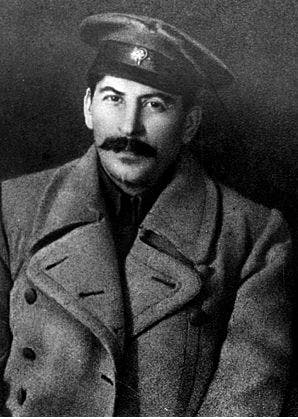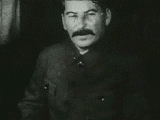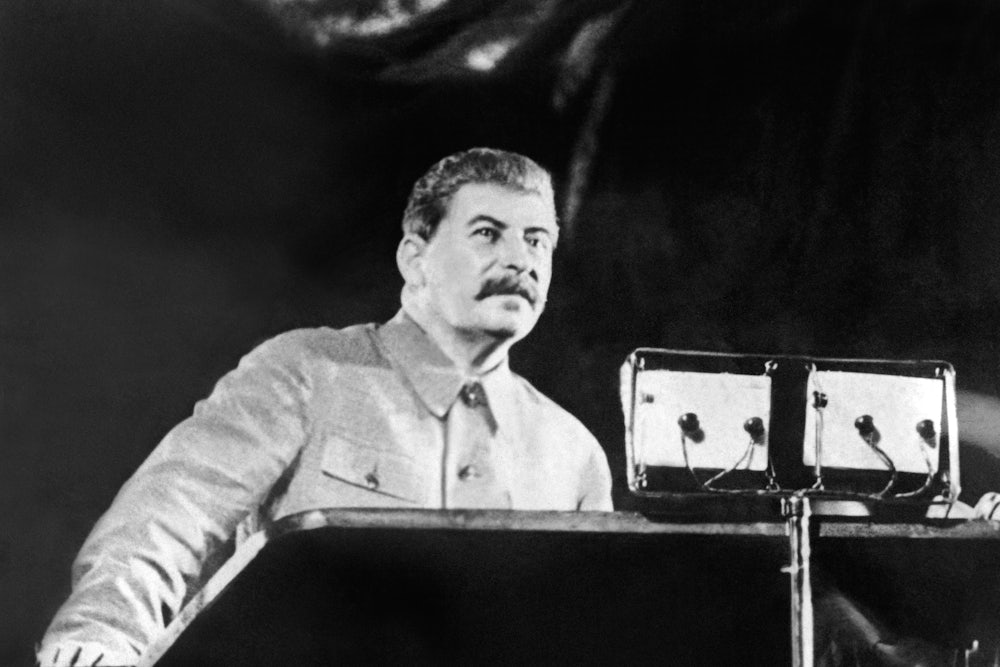It is difficult to say how sincere the people of Russia were in their manifestations of grief over the final departure from the scene of Joseph Vissarionovich Stalin. After more than a quarter of century of his rule over the most intimate details of their lives, they have learned to suppress spontaneous manifestations of real feelings as well as they have learned to master their parts in bureaucratically staged exhibitions of pseudo-spontaneous expressions of the “people’s will.” They may have been crying over the departure of the remote dictator whom official propaganda, capitalizing on the craving for a father symbol, has built up as the benevolent though occasionally harsh leader and teacher. But it is more likely they cried with apprehension over the shift from the grim but already assimilated realities of the Stalin era to the prospects of new uncertainties and unpredictable peculiarities of a new self-styled father of the people.
The outside world certainly showed little inclination to concentrate on the human story involved in the demise of J.V. Stalin. There were no friendly words, and remarkably little of the stereotyped philosophizing over the inevitable passing of all that is human. Stalin’s departure was viewed as an act of state. The stock exchange reacted with a dip, as it is likely to do when important political developments are impending. The two questions most frequently asked were: Is Russia entering a new Time of Troubles, similar to that which in the past has shaken up the stability of what ambitious and ruthless rulers have built up? Will the transfer of supreme power, so unpredictable in a dictatorship, mean more trouble to the outside world or attractive openings which this time will be utilized more intelligently than on the occasion of past Times of Troubles?
It was entirely proper that the departure from the scene of a man who has devoted most of his life to politics and public life should take place in a setting of respectable impersonality, under the collective vigil of his political associates. There was no emphasis in the official announcements on the presence of a wife or children at Stalin’s bedside; it is not even known whether or not he remarried after the death of his second wife in 1932. By comparison, there was a strong, if corny, element of human interest in the circumstances under which Hitler left and Mussolini was dispatched from this world, the one holding hands with the girl he married to legalize a typically petty bourgeois romance, the other strung up in a gruesomely operatic fashion alongside the body of his mistress. Stalin’s great passion, and possibly his only love, was politics, sometimes described as the craft of force, fraud, and favors.
It is as practitioner of this art of politics, carried to inhuman but not illogical extremes, that Stalin will enter history. His achievements, apart from those which only the lapse of time can put in proper perspective, can be measured only with the yardstick peculiar to the field of politics with its specific notions of success and failure. By the same token, one can only answer in those terms the question whether Stalin was a happy man, proud of his achievements. “There can be no greater pleasure in life than to choose one’s enemy, inflict a terrible revenge on him, and then go quietly to bed,” Stalin is reported to have said in private in 1926. Even if the remark was never made, it fits Stalin quite well. Just as he is quoted as having said to Tito: “Restore King Peter. ... You need not restore him forever. Take him back temporarily, and then you can slip a knife into his back at the suitable moment.” (V. Dedijer, Tito, p. 233.) We are shocked; Machiavelli would have nodded with understanding.

The image of Stalin established by official propaganda is, of course, of no help in evaluating his personality and defining the essence of what is, vaguely called “Stalinism.” Soviet sources speak of him as being primarily a Marxist scholar of genius, a legitimate successor of the three bearded prophets; only after paying homage to his talents as a scholar do the official biographers mention Stalin’s great practical, organizational talents. Yet this is a characteristic upside-downness, long practiced in the Soviet Union under Stalin’s own guidance. Stalin’s talents were mostly in the field of organization and political intrigue. His contribution to Marxist teachings may be unique, but it is unique in the sense that it was designed to overcome whatever obstacles the holy scriptures of the creed posed in the way of political action. Stalin has trained a generation of Russian intellectuals and party workers in what he called “living Marxism” which in his interpretation meant the art of fitting all changes dictated by practical necessity into the framework of a seemingly rigid doctrine. He has, as Klaus Mehnert put it, “relativized Marx.”
It may be argued that whatever Marx, Engels, and even Lenin had said was of only limited practical use in the solution of problems facing the leader of a victorious revolution which had entered the stage of stabilization and was becoming a “going concern.” Lenin had already done violence to the theory of the “withering away of the state” in order to justify his choice of the institution of the Soviets as the vehicle for a revolutionary government that was to prepare its own “withering away.” But Stalin had to carry this process much further. It may be utterly incomprehensible to the Western mind why the successful leader of a regime established after the elimination of enemies and rivals should have to engage in long and involved theoretical disputes in order to make his obvious, and in a sense understandable, practical moves appear as justified by doctrine. The answer must probably be sought outside the general tendency of rulers to claim continuity with what they actually uproot. Stalin seems to have undertaken a long war against the essentially idealistic inclinations of the Russian intelligentsia, its craving for a grounding of its actions in absolutes, in a basic “world view.” This brings us to what appears to be the essential difference between Stalin and the other “old Bolsheviks” whom he felt he had to get rid of not only because of the threat which they presented to his personal dictatorial ambitions but also because of their belief in Communism clashed with his basic lack of faith.
“Principles never exerted any influence over Stalin”—his unsuccessful rival Trotsky writes in the bitter and occasionally vicious study of the Soviet dictator. “The immediate administrative task always loomed before him greater than all the laws of history.” But the art of governing consists primarily of taking care of a succession of administrative tasks. Stalin apparently felt that principles, even Marxist principles when rigidly applied, were an obstacle to the proper and successful performance of administrative tasks. His efforts in the field of theory were directed at subverting theory. He could not do it in the same terms in which he had expressed his doubts about religion at the age of 13 (according to the memoirs of the Georgian Glurdzhidze): “You know, they are deceiving us. There is no God. The talk of God is empty chatter.” He had acquired a vested interest in posing as a legitimate continuator of Marx, Engels, and Lenin. On occasion, however, his references (especially to the two non-Russians) give the impression that he is saying in a polite way that their teachings were empty chatter and certainly an obstacle rather than a help in guiding the actual course of the Soviet state, in theory destined to “wither away” but in practice determined to stay very much alive.
But Lenin, too, it will be said, had an eminently practical mind and never allowed doctrine to stand in the way of political moves dictated by expediency. Yet Lenin, though not exactly devoted to what is called “government by the people,” had a basic confidence in people and in their performance when properly led. Stalin was constitutionally unable to rely on any true spontaneity; things may be made to appear spontaneous but they had to be carefully engineered by the aparat of the ruling bureaucracy. Lenin honestly disliked bureaucrats; Stalin built them up, in the party and in the government, and made them—not Marx’s proletariat, not Lenin’s “masses”—the real rulers of Russia. “Socialism,” he wrote quite early, “is built not on sentimental feelings, not on abstract justice, not on love for the proletariat, but on scientific principles.”
This boast of being in possession of a “scientific” formula for the seizure and retention of power accounts for Stalin’s insistence on disguising his “teachings,” in essence a set of instructions to the bureaucracy in the apparatus of the party and government (and also in the arts and sciences which are mere auxiliaries of the totalitarian effort of the government) as contributions to Marxism. And unlike Lenin, who relied on his powers as an orator and debater to make others accept his point of view, Stalin, who always was a poor speaker, discarded shortly after his accession to power the habit of debate, not only for the mass of citizens, but also within the party and even in its inner councils. Party congresses were simply not convened or else so organized that they performed no more than a solemn ratifying function, similar to that of the Supreme Soviet, allegedly Russia’s supreme legislative body.

Impervious to belief, Stalin was always given to doubt and suspicion. Always inclined to engage in intrigue, he saw intrigue everywhere. Trotsky claimed that Stalin had what he called “a defensive-offensive reflex” which made him suspect plots and react violently to what were essentially unreal situations but situations which to his mind appeared quite plausible and therefore called for suppression. He transferred the same attitude to the outside world; even while conjuring the superficial amiability which he could display whenever necessary, he looked at people like Churchill and others who came to negotiate with him, always trying to figure out what they were up to. He could find an easy, even if incorrect, answer by figuring what trick he, himself, would have played on his opposite number in such a situation. Such an attitude generates exaggerated caution which makes real compromise extremely difficult. Whenever Stalin showed a friendly impulse, he would immediately check himself, possibly for fear of being cheated.
Such an attitude, or that part of it that cannot be attributed to Russian “national character,” must be rooted deeply in the personal makeup of the man displaying it. Yet we don’t know enough about Stalin as a human being to get to the bottom of this all-pervading lack of faith and confidence. Was this attitude generated by the necessity to avoid the heavy blows which would suddenly fall upon his head from the hand of an unsuccessful an drunken father? Was it the result of the adolescent theological student’s maneuvering against the oppressive regime of the Orthodox seminar where vicious monks were constantly snooping for forbidden books? Was it the nervous tension in which the young man of many aliases, disguises, and passports had to live in efforts to duck the vigilant Tsarist police? Or the more prosaic consciousness of personal shortcomings (pockmarks, short stature, plain looks, lack of success with girls?) which makes one convinced that he is surrounded by a world of ill-wishers conniving at his doom?
We simply know too little about the man Stalin to answer these questions meaningfully. His old mother, cynically exploited for the propaganda of the virtues of family life for which the stabilized revolution felt a great need merely said to reporters that “Soso was always a good boy.” Others offered fragmentary recollections which made old Keke’s statement appear questionable. But we really have before us only the results, not a valid interpretation of Stalin’s forceful though unamiable personality. And it is with these results that the world has had to contend.
Many great men have earned their claim to immortality by upsetting things rather than by conferring tangible and clearly visible benefits on their fellow men. Measured in these terms, Stalin’s claim to immortality is undeniable. Unlike the record of Hitler and Mussolini, his life has been more than just a blown up personal adventure disguised as statesmanship. His departure is a merciful act of nature after a hard life, not the acknowledgment of the failure of a dream of empire.
In his last conscious moments Stalin, unable to believe in the force of ideas and mistrustful of people, may yet have felt that he had successfully trained a group of top followers in the art of dealing with problems by the sheer magic of determined political manipulation. Stalinism may survive for a long time as an “un-theory” in the service of the administrators, a code of political behavior completely sterilized of anything except what is necessary to hold power, a pursuit complete in itself without reference to any discernible aims of human welfare.
